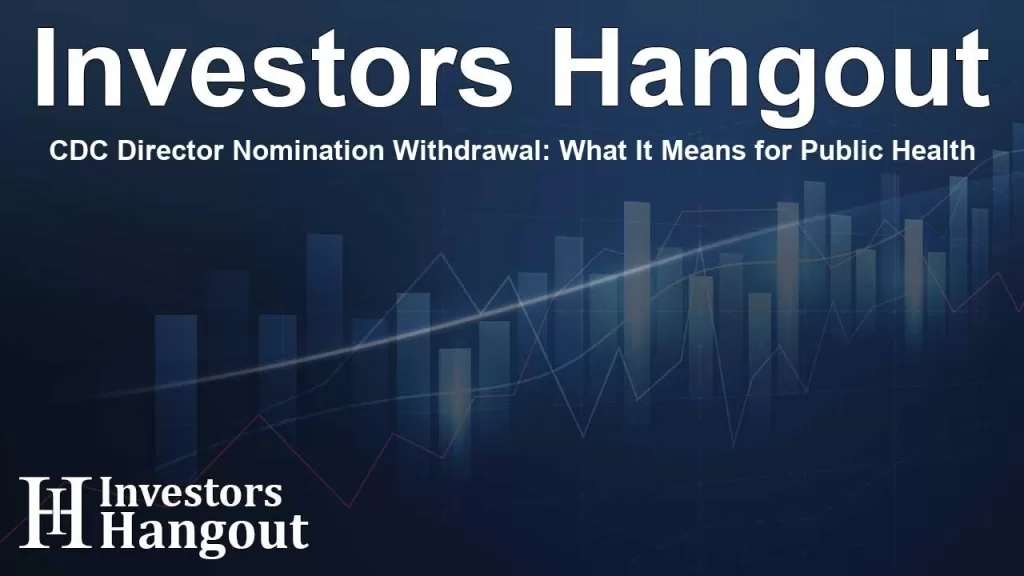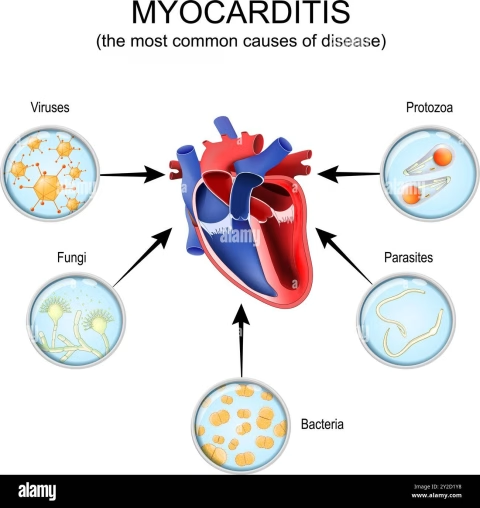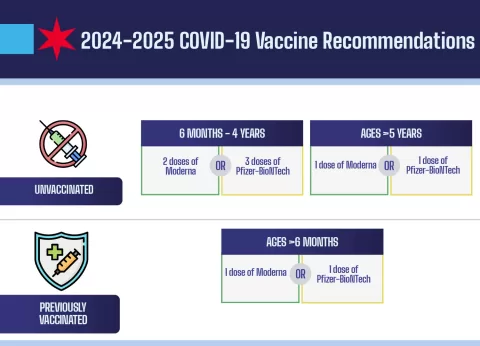The recent withdrawal of CDC Director nomination has sent ripples through the medical community, particularly as the nation grapples with rising immunization concerns. David Weldon, a physician and former congressman nominated by Trump, faced significant scrutiny regarding his stance on vaccines, largely due to his public questioning of the measles, mumps, and rubella (MMR) vaccine’s safety. With the anti-vaccine movement gaining momentum, the timing of such a nomination raised alarms, especially amidst a measles outbreak in Texas and New Mexico affecting unvaccinated populations. Critics, including Sen. Patty Murray, highlighted the potential dangers of leading the CDC with someone who has a history of promoting vaccine safety concerns. As discussions unfold, it’s clear that the direction of public health policy is at a critical juncture, making the choice of leadership at the CDC more impactful than ever.
In light of the recent developments surrounding the withdrawal of a nomination for the leading position at the Centers for Disease Control and Prevention, the implications for public health are profound. The former congressman, who held anti-vaccine sentiments, sparked widespread debate in the Senate about the safety and efficacy of vaccines during critical outbreaks. As misinformation about vaccine safety proliferates, especially from influential figures, the role of the CDC director becomes crucial in restoring trust in immunization efforts. The struggle against the anti-vaccine narrative emphasizes the need for scientific integrity at the helm of this vital public health institution. This situation brings to light the urgent need for leadership that prioritizes scientific consensus amidst rising health concerns in the community.
Trump Withdraws Nomination for CDC Director David Weldon
In a significant turn of events, the Trump administration announced the withdrawal of David Weldon’s nomination to lead the Centers for Disease Control and Prevention (CDC). This decision comes in the wake of fierce scrutiny regarding Weldon’s views on vaccine safety, particularly relating to the MMR vaccine. While Weldon, a former Florida congressman, was expected to engage in a confirmation hearing with the Senate Committee on Health, Education, Labor and Pensions, concerns regarding his stance on immunization policies may have played a crucial role in this withdrawal.
Weldon’s past comments and legislative actions, which questioned CDC vaccine safety research, raised alarm among public health advocates, especially during a time when the U.S. is facing a troubling increase in measles cases linked to the anti-vaccine movement. The administration’s decision indicates a growing recognition of the need for a CDC leader who prioritizes robust scientific evidence in vaccine advocacy, particularly amidst rising vaccine skepticism fueled by figures like Robert F. Kennedy Jr. This withdrawal underscores the importance of aligning the CDC with professionals who can effectively manage and counteract public health threats.
Impact of Measles Outbreak on Vaccine Policy
The ongoing measles outbreak in Texas and New Mexico serves as a stark reminder of the potential consequences of vaccine hesitancy. Public health officials have emphasized the critical role that the MMR vaccine plays in preventing these outbreaks, and yet skepticism surrounding vaccine safety continues to persist among segments of the population. With David Weldon’s withdrawal from the CDC nomination, there is a renewed call for leadership that effectively communicates the importance of vaccination programs to counteract the rise of the anti-vaccine movement.
Senator Patty Murray’s comments reflect deep-seated concerns regarding the implications of vaccine skepticism at this juncture. As the nation grapples with one of the worst measles outbreaks in years, the urgency of fortifying immunization policies becomes paramount. The CDC’s ability to monitor and mitigate infectious diseases hinges on leaders who embrace science-based guidelines and advocate for vaccination. Thus, this situation emphasizes not only the immediate need for competent leadership but also a coordinated national response to preserve public health.
Vaccine Safety Concerns and Public Health Implications
Vaccine safety concerns remain a contentious issue within public discourse, significantly influencing health policy and the decisions of parents regarding childhood vaccinations. Historically, vaccine skepticism has been galvanized by misinformation and sensational claims, leading to increased rates of preventable diseases like measles. The Trump administration’s initial nomination of David Weldon illustrated how controversial views on vaccine safety could impact leadership roles within critical health agencies like the CDC.
As experts reaffirm the safety and efficacy of vaccines, the importance of cohesive public health messaging becomes evident. Misinformation propagated by anti-vaccine proponents can deter individuals from seeking vaccinations, thereby heightening the risk for outbreaks. Addressing these vaccine safety concerns requires a rigorous commitment to education and transparency, particularly from federal health authorities. The CDC and its leadership must reinforce trust within communities, thereby ensuring that public health strategies are grounded in scientific evidence and help to counter misleading narratives.
Senate’s Role in CDC Director Confirmation
The confirmation process for the CDC director has evolved significantly, especially following the changes instituted in 2023, requiring Senate approval for this critical position. This procedural shift represents a strategic effort to enhance accountability and ensure that individuals tasked with safeguarding public health are thoroughly vetted and possess a commitment to evidence-based practices. As exemplified by David Weldon’s withdrawal, the Senate’s role is pivotal in determining the suitability of nominees who will lead the CDC through challenging health landscapes.
The Senate Committee on Health, Education, Labor and Pensions is charged with evaluating nominees based on their qualifications and stances on pressing public health issues, including vaccine-related policies. As seen with the scrutiny Weldon faced, nominees’ prior statements and actions concerning vaccines can significantly sway the confirmation process and reflect on the Senate’s responsibility to support scientifically sound health leadership. This vetting process ensures that the person leading the CDC aligns with the agency’s mission to protect public health and enhance vaccine confidence.
The Unfolding Response to the Measles Outbreak
The response to the measles outbreak in Texas and New Mexico underscores the urgency of appropriate health policy interventions. Health officials are calling for increased vaccination outreach to combat the spread of measles, particularly among unvaccinated children. Amidst rising vaccine hesitancy, the educational campaigns aimed at clarifying vaccine safety and effectiveness are more crucial than ever to assuage public fears and misinformation espoused by anti-vaccine advocates like Robert F. Kennedy Jr.
As the CDC continues to navigate challenges posed by outbreaks, the need for leadership that prioritizes science-based approaches becomes starkly evident. The withdrawal of David Weldon may serve as a turning point, prompting federal agencies to reflect on their positions and the implications of vaccine skepticism. Comprehensive public health strategies must be employed to manage the current measles outbreak and prevent future occurrences, fortifying community trust in vaccines and the institutions that recommend them.
Public Sentiment Around Vaccine Leadership
Public sentiment regarding vaccine leadership is increasingly polarized, with strong opinions on both sides of the vaccine debate. The Trump administration’s decision to withdraw David Weldon’s nomination reflects an awareness of the critical nature of public trust in health officials, especially as vaccine misinformation proliferates. Advocates for immunization have applauded the move, emphasizing that leadership grounded in scientific integrity is essential for effective public health policy.
In this climate of uncertainty, the selection of a new CDC director will be closely scrutinized by both supporters and detractors of the vaccination agenda. Stakeholders from various sectors, including health professionals and citizens, are eagerly awaiting a nominee who can unite the community around vaccination efforts. The ability of a CDC director to address vaccine safety concerns head-on and build public trust will be essential to reversing the trend of vaccine hesitancy and effectively combating infectious diseases.
Consequences of Vaccine Misinformation
The rising prevalence of vaccine misinformation has dire consequences for public health, contributing to the resurgence of diseases like measles that were previously under control. Notable figures in the anti-vaccine movement have propagated false narratives linking vaccines to autism, undermining years of public health efforts aimed at promoting immunization. With leadership challenges like the recent withdrawal of David Weldon, it is evident that addressing vaccine misinformation must be a top priority for health leaders in the United States.
Tackling the spread of misinformation requires a multifaceted approach, including transparent communication of scientific findings and community engagement initiatives. Health leaders must work diligently to counteract misleading information with factual evidence that supports vaccine safety and efficacy. The ongoing measles outbreak highlights the critical need for coordinated public health responses that not only clarify vaccine benefits but also actively dismantle the detrimental myths that compromise herd immunity and public safety.
Importance of CDC in Setting Immunization Policies
The Centers for Disease Control and Prevention (CDC) serves an essential role in shaping immunization policies that protect public health across the United States. By overseeing immunization guidelines, the CDC ensures that vaccines are accessible and recommended based on empirical research and safety data. The recent discussions surrounding the CDC director’s nomination illustrate the increased importance of aligning leadership with the values of scientific integrity and public health advocacy.
The agency’s authority to promote vaccination programs is critical in maintaining population immunity, which directly impacts the health of communities. The withdrawal of David Weldon, who held controversial views on vaccine safety, highlights the necessity of appointing a director committed to combating misinformation and reinforcing confidence in vaccines. A robust CDC leadership that embraces fact-based strategies can effectively enhance public understanding of vaccination’s importance and its role in preventing outbreaks.
Looking Forward After the Withdrawal
In the wake of the withdrawal of David Weldon’s nomination for CDC director, many are left considering the future trajectory of public health leadership in the United States. Each appointment has the potential to influence national health policy, especially regarding vaccination programs that are crucial for preventing outbreaks like measles. The search for a new nominee provides an opportunity for the administration to reflect on the qualities needed in a public health leader, particularly regarding their stance on vaccine safety.
Moving forward, the next nominee must be someone who can effectively engage with both the public and the scientific community to combat the growing tide of anti-vaccine sentiment. Engaging experts in public health communication will be vital to restoring confidence in the CDC’s authority and mission. The hope is that this transition will ultimately yield a director who can help lead the charge against misinformation and reinforce the indispensable role vaccines play in safeguarding public health.
Frequently Asked Questions
Why did Trump withdraw the nomination of David Weldon for CDC Director?
The Trump administration withdrew David Weldon’s nomination for CDC Director amid concerns that he would not secure enough Senate votes for confirmation. His history of questioning vaccine safety, particularly regarding the MMR vaccine and its alleged link to autism, raised alarms during a time when the nation is experiencing a significant measles outbreak.
How does the anti-vaccine movement relate to the withdrawal of David Weldon’s nomination for CDC Director?
David Weldon was viewed as a proponent of the anti-vaccine movement, which contributed to the fears surrounding his nomination as CDC Director. Given his past criticisms of vaccine safety and association with anti-vaccine theories, many, including Senate members, felt that his leadership could compromise public health strategies, especially during a measles outbreak.
What impact would David Weldon’s views on vaccine safety have had if he was confirmed as CDC Director?
If confirmed as CDC Director, David Weldon’s track record of questioning vaccine safety could have hindered efforts to promote vaccination and manage public health crises. His skepticism regarding vaccines, particularly in the context of a measles outbreak, raised concerns about the CDC’s ability to effectively advocate for immunization programs.
What role does the CDC Director play in addressing vaccine safety concerns amid outbreaks?
The CDC Director oversees national immunization policy, making it crucial for this position to embrace evidence-based science on vaccines. With Weldon’s nomination withdrawal amidst a measles outbreak, many experts emphasize the need for a leader who will prioritize vaccine safety and combat misinformation, especially given the rising anti-vaccine sentiments.
What are the implications of the CDC Director nomination process changing in 2023?
The change in the CDC Director nomination process to require Senate confirmation in 2023 means that nominees like David Weldon face increased scrutiny. This is particularly important in light of vaccine controversies and health crises, like the current measles outbreak, necessitating a leader committed to public health and vaccination efforts.
Are there concerns about vaccine safety during the current measles outbreak?
Yes, the current measles outbreak has amplified concerns about vaccine safety, particularly among unvaccinated populations. The controversy surrounding figures like David Weldon and the anti-vaccine movement reflects a broader national dialogue on vaccine safety, pivotal in controlling outbreaks and ensuring community health.
| Key Point | Details |
|---|---|
| Nomination Withdrawal | David Weldon’s nomination for CDC Director has been withdrawn by the Trump administration. |
| Background on Nominee | Weldon is a physician and former congressman with a controversial stance on vaccine safety. |
| Previous Actions | Weldon coauthored a 2007 bill to limit CDC’s vaccine safety research. |
| Concerns Regarding Vaccines | His views on vaccines drew significant scrutiny, especially with a measles outbreak in the U.S. |
| Senate Reaction | Sen. Patty Murray criticized Weldon’s nomination due to his anti-vaccine views amid a measles outbreak. |
| Next Steps | There is no announcement yet on who will be nominated next for the CDC Director position. |
Summary
The withdrawal of the CDC Director nomination highlights significant concerns regarding the qualifications of David Weldon, particularly his controversial views on vaccines amidst a public health crisis. The Trump administration’s decision emphasizes the importance of appointing a CDC Director who aligns with scientific consensus to effectively manage the nation’s public health initiatives. As discussions around this nomination unfold, it remains crucial to focus on selecting a candidate committed to science and public health.
The content provided on this blog (e.g., symptom descriptions, health tips, or general advice) is for informational purposes only and is not a substitute for professional medical advice, diagnosis, or treatment. Always seek the guidance of your physician or other qualified healthcare provider with any questions you may have regarding a medical condition. Never disregard professional medical advice or delay seeking it because of something you have read on this website. If you believe you may have a medical emergency, call your doctor or emergency services immediately. Reliance on any information provided by this blog is solely at your own risk.








